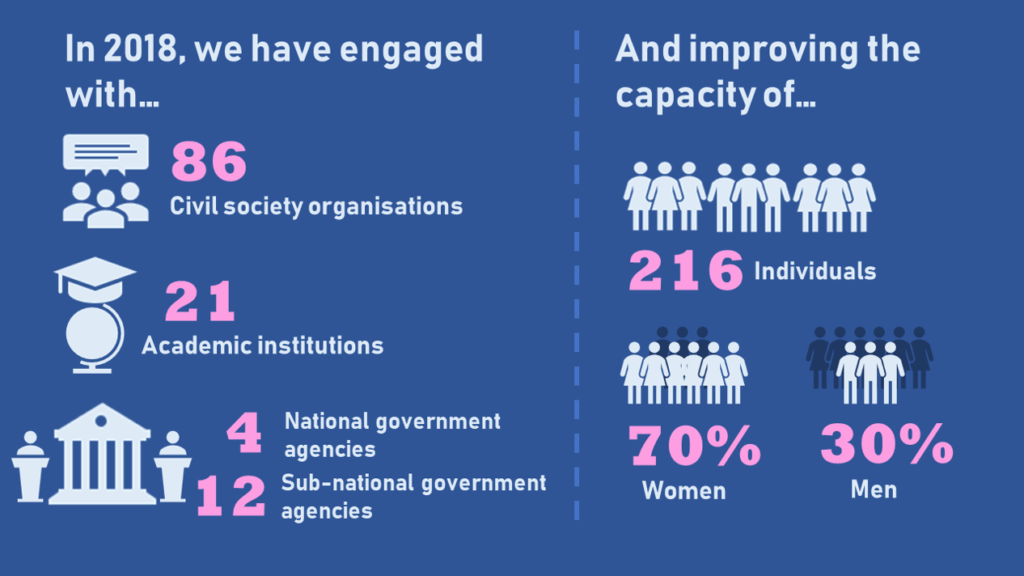
Every first quarter of the year, we at the Jakarta Lab reflect on the past year’s activities and take stock of what we have done so far in terms of promoting the use of open data in Indonesia and in surrounding countries in Asia to achieve political, economic,and social change. Established in 2015 with the generous support of the Ford Foundation, the Lab has continued to fulfill its mission by experimenting with open data to strengthen transparency, improve public service delivery, and enhance citizen participation in governance in Indonesia and regionally.
While this blogpost came in late (we normally issue one every April of the year) because of several challenges that the Lab needs to address, including challenges in raising resources for its experimental projects, we still think it is useful to reflect on the year that has been to inform lessons in moving forward.
We continued to build partnerships and explored new ways of working.
In 2018, we partnered with different organizations to research and implement different thematic projects. We worked with a new partner, the East West Management Institute to study data sharing mechanism in the lower Mekong region in order to analyse the opportunities and risks as well as the appropriate risk management strategies for civil society organizations and tech communities in Cambodia, Laos, Myanmar, Vietnam, and Thailand to share open data. We continued our partnership with the Goethe Institut-Indonesien to explore better ways of building data literacy for girls in central Jakarta. Finally, we worked with the World Bank, once again, to build use cases of open contracting data in the city of Bandung, together with Indonesia’s National Procurement Agency and the City Government of Bandung.
We expanded our research and experimentation to focus on the digital lives of young girls and the role of women in open government.
Last year, a key focus of our research was on how young girls are interacting with technology and how women participate in open government. We conducted research on how young women in three countries – Kenya, Indonesia and the Philippines – are interacting with, and affected by, social media. Also, with support from IDRC, we have conducted research on how women are participating in Open Government Partnership (OGP) processes in pioneer member countries – Indonesia and the Philippines, with the report recently launched in May this year.
We also conducted experiments on how we can improve data literacy for young girls and women, either to create positive content, or participate more meaningfully in governance processes. Finally, partnering with the Goethe Institut-Indonesien and the PASCHE Network, we designed and implemented an experiment in increasing data literacy of high school students in Jakarta and Bandung.
We deepened our work on open contracting through more intensive research and use-case experimentation.
Together with HIVOS Southeast Asia, we explored the potential, opportunities, and challenges of civil society organizations to act as infomediaries to translate open contracting data to useful information for different users. With funding support from the World Bank, we worked with the city government of Bandung to identify, define, and implement uses of open contracting at the city government level, where we worked with journalists, civil society organizations, and university students.
Above this, we continued to assess how open data has fared in East, Southeast, and South Asia and recently published our work on the state of open data in the region that you can find here.
Over the past year, and through these activities, we have engaged with 86 civil society organizations, 21 academic institutions, 12 national government agencies, and 4 subnational governments.
We have also contributed to improving the capacity of 216 individuals, 70% women and 30% men, to understand and make use of data that matters to them.
This could not have been made possible without the strong support of the partners we work with and the trust of our funders and supporters. We thank everyone who has made these achievements possible.
To learn more about the work of the Lab, please visit our project page or follow us on Twitter for latest updates.
Leave a Reply